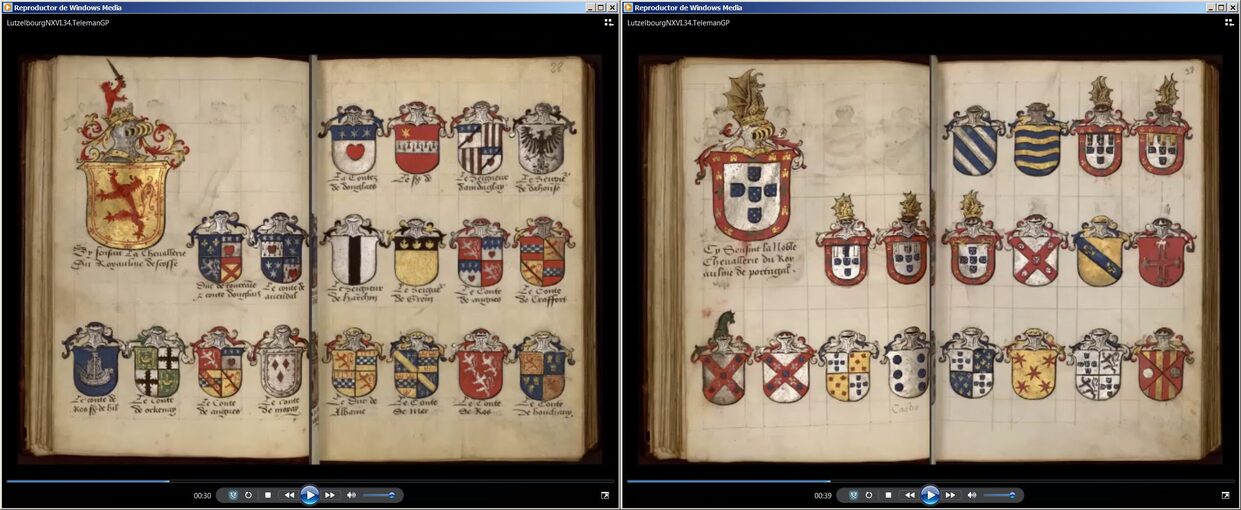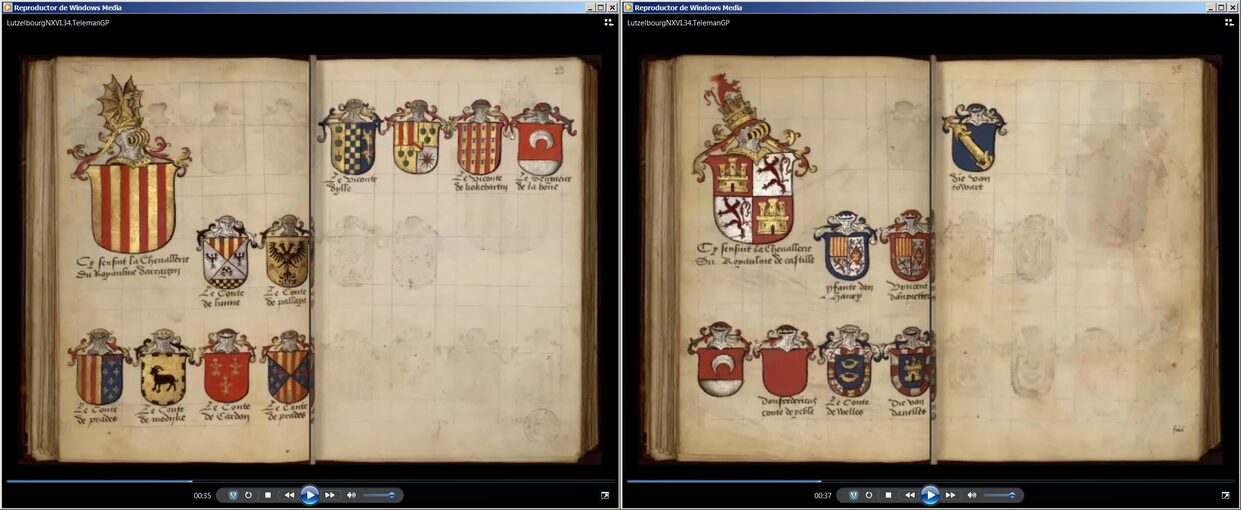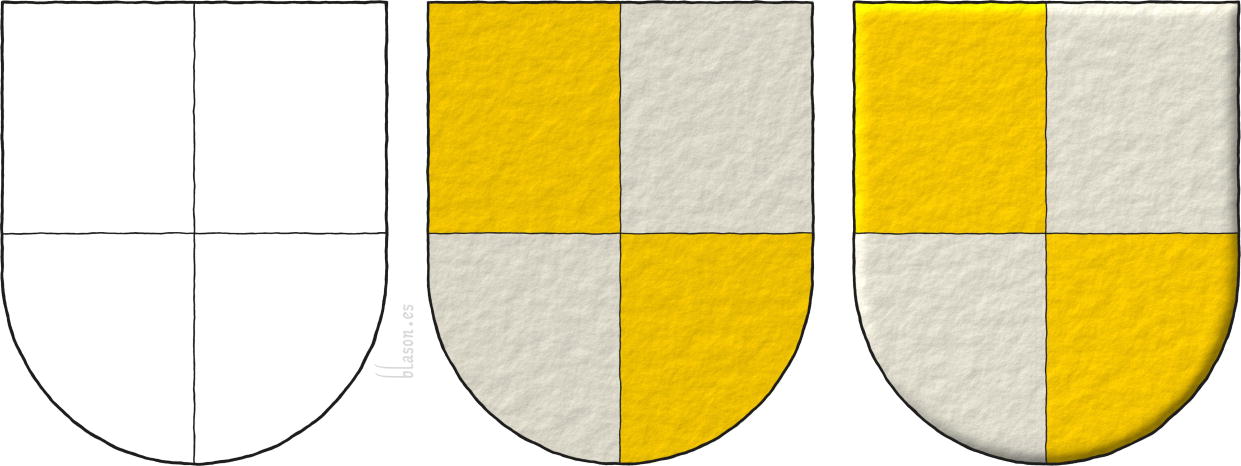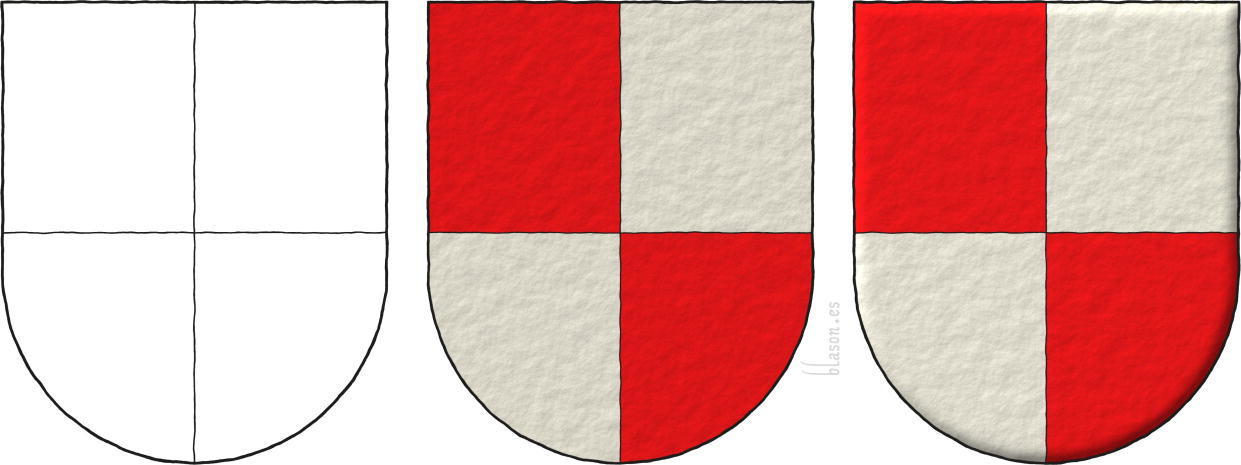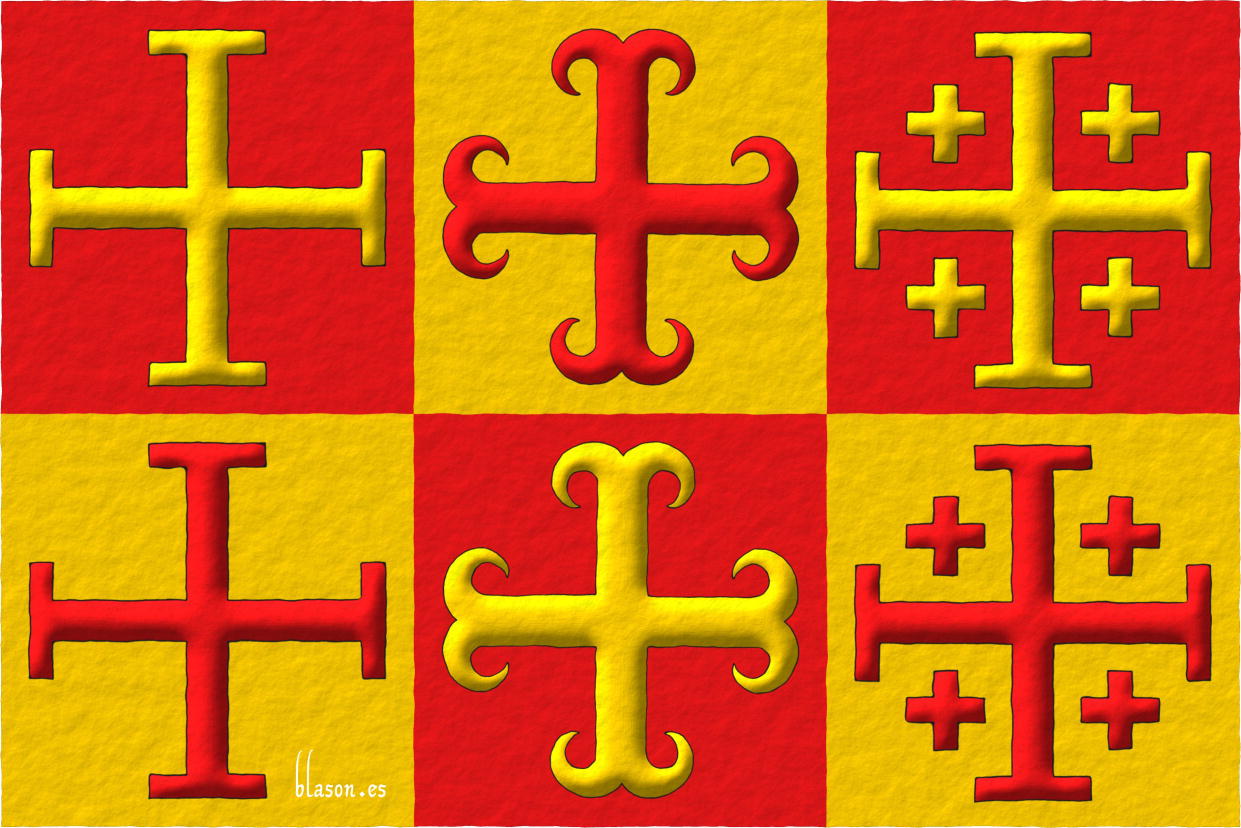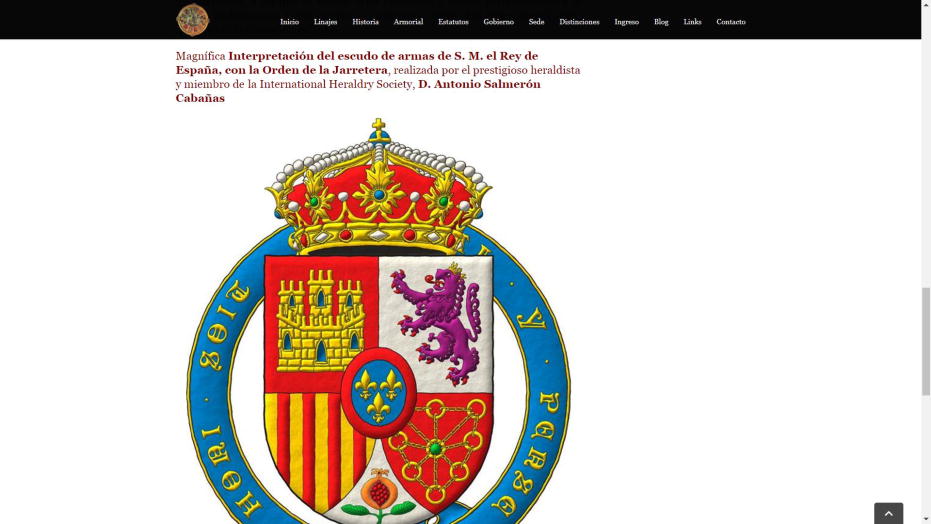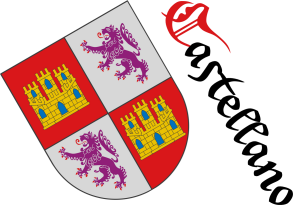
![Ver [Lutzelbourg, N. de; 1530] en referencias bibliográficas. Libro abierto, hojas de plata, filo de oro, guardas de gules, tapas de sable.](../css/Libro.Bibliografia.png)
Lutzelbourg, N. de; 1530
Nicolas de Lutzelbourg, lord of Fléville and captain of Nancy, «Roll of arms», sixteenth century (the author lived between 1485? and 1547), manuscript in French on parchment, with 230 pages numbered later with pencil the odd pages from 1 to 115, 29 x 21 cm, Bibliothèque-Médiathèque of Nancy digitized, source of the images with open license.
Video of 120 seconds composed for the Biblioteca Genealógica, Heráldica y Nobiliaria. Music by Georg Philipp Telemann (1681, 1767), Concerto for 4 Violins No. 2, TWV 40: 202, II. Grave, interpreted by Viola Viva, with Creative Commons license of Attribution and ShareAlike.
Content examples: Scotland on pages 28, 29 and 30 with 61 coat of arms; Aragon on page 33 with 11 coat of arms; Castile and Leon on page 35 with 8 coat of arms; Navarre on page 36 with 1 coat of arms; and Portugal on pages 37 and 38 with 27 coat of arms.
Bibliographical reference of century XVI.
Classification: Manuscript, Armorial roll, French language and In color.
Author: Lutzelbourg, Nicolas de.
Bibliographic reference mentioned in the following articles:
External links:
- Manuscript's record in the Bibliothèque-Médiathèque of Nancy.
- Manuscript's pages in the Bibliothèque-Médiathèque of Nancy.


Quarterly Or and Argent and quarterly Gules and Argent, comparison
The rule of tincture, «metal should not be put on metal, nor color on color», is the most famous rule of the heraldry. In the divisions of the field, for example, party per fess, party per pale, quartered, etc., the tinctures are beside each other, not one on top of the other, because the divisions are not charges, so the rule of tincture does not apply. Although as a rule of aesthetics may be useful in the case of divisions.
Blazon keywords: Quarterly, Argent, Gules and Or.
Style keywords: Freehand, Outlined in sable, Plain tincture and Illuminated.
Classification: Schema.


Cross potent, cross moline, and cross of Jerusalem, comparison
A Gules and Or comparison between cross potent, cross moline, and cross of Jerusalem
Blazon keywords: Gules, Or, Cross potent, Cross couped, Cross moline, Cross of Jerusalem and Cross.
Style keywords: Freehand, Outlined in sable and Illuminated.
Classification: Schema.


![Ver [Stock, E.; 1895] en referencias bibliográficas. Libro abierto, hojas de plata, filo de oro, guardas de gules, tapas de sable.](../css/Libro.Bibliografia.png)
Stock, E.; 1895
Elliot Stock, «The Antiquary, A Magazine Devoted to the Study of the Past», Volume XXXI, Published by Elliot Stock, London, 1895.
Glossary of Terms used in British Heraldry
«The late Mr. John Henry Parker's name is so closely associated with quite a small library of admirable manuals on architecture, and with a number of other works on archaeology, all of which are well known, that it will be something of a surprise to many persons to learn that about fifty years ago», 1895 - 1847 = 48 years, «he published» [Parker, J. H.; 1847; Glossary of Terms used in British Heraldry].
«The book, too, has been out of print so long that it has become almost forgotten».
Glossary of Terms used in Heraldry, a new book
«The new edition now published by his son, Mr. James Parker», [Parker, J.; 1894; Glossary of Terms used in Heraldry], «is practically, as he himself tells us, a new book, and the elaboration and care which have been bestowed upon it are as characteristic of this as they are of the other archaeological works, for which both father and son have been so honourably distinguished for more than half a century».
Illustrations
«Another well-known characteristic of the Messrs. Parker's books is the copious manner in which they are illustrated».
«The present volume fully maintains that reputation, and the neat little woodcuts, which occur in great profusion on nearly every other page, are often a great help in explaining in a practical manner the significance of a heraldic term».
«To anyone who is beginning the study of heraldry this will render the book of great value and usefulness; while others who know more or less of the science will not be disposed to regret the lavish manner in which explanatory illustrations are provided».
Critic, Chichester and Prester John
«So far as it is possible to judge there are very few, if any, inaccuracies in the book, although we are bound to express surprise in finding in such a work as this, the old fiction repeated, that the figure of our Saviour, in relation to the dedication of the cathedral to the Holy Trinity, on the arms of the See of Chichester is that of the mysterious being known as Prester John».
«We thought this absurd theory had been fully exploded long ago, and to find it perpetuated in a work like this is a little startling, to say the least».
The 3 main references in James Parker's book to Prester John the See of Chichester are the following:
- About the Presbyter John, usually called Prester John: «this singular figure is represented as seated on a stone (described as a tombstone), and forms the insignia of the See of Chichester, the only instance in which the bearing occurs», [Parker, J.; 1894; page 476]. «The origin of the figure is obscure». «In 1180 the seal represented the Figure of Christ seated on a Tomb, with perhaps a symbolical reference to» the Book of Revelation i. 16, and v. 1, also called the Apocalypse of John the Apostle. «Early in the next century the mythical story of Prester John, a supposed King of central Asia, was current, a certain Franciscan monk, by name Carpini, who went out as a Missionary in 1206, having brought home or invented the story, and this being very popular was afterwards, perhaps, applied to the device».
- About the blazon of the Bishopric of Chichester, he writes «Bishoprick»: «Azure, a Presbyter John hooded sitting on a tombstone, in his sinister hand a book open, his dexter hand extended with the two forefingers erect, all or; in his mouth a sword fessways gules, hilt and pommel or, the point to the sinister», [Parker, J.; 1894; at the end of the page 476].
- About «tombstone» as an heraldic term, [Parker, J.; 1894; page 576] writes: «the seat of Prester John (q.v.)» ~ quod vide ~ which see «in the insignia of the See of Chichester, and of Saint Mary in those of the See of Lincoln», see also the term nimbus or «Cicle of Glory» at [Parker, J.; 1894; page 424], «is so called, though in neither case is it at all probable that the bearing is intended for such».
«It would be an interesting fact to ascertain exactly when and by whom», Elliot Stock asks himself, «the very wild idea of Prester John on the Chichester shield was first started».
Nowadays, the Diocese of Chichester, in its on-line explanation about its coat of arms, writes «The most common misconception, which was still being repeated in 1894», the Diocese does not cite directly James Parker's book, but cites its publishing year 1894, «was that the arms show Presbyter John sitting on a tombstone». «A letter circulated in Europe in about 1165 referred to the annual visit of Prester John and his army, complete with chariots and elephants, to the tomb of the prophet Daniel in Babylonia Deserta». «It was the imagery of this letter», about the Prester John and the tomb, «that seems to have become attached to» the coat of arms of the Diocese of Chichester with its human figure, nimbed, sitting in a tomb or an altar.
Conclusions
«As showing the thoroughness with which Mr. James Parker has done his work, we may mention that»:
- «no less than 32 pages are taken up in describing the different heraldic forms and uses of the cross», [Parker, J.; 1894; from the page 149 to the beginning of the page 179] and with an internal index, dedicated exclusively to the cross, on [Parker, J.; 1894; pages 179 and 180].
- «and 8 with the various forms of the crown», [Parker, J.; 1894; from the page 181 to the page 188].
«In every instance the subject dealt with is thoroughly worked out».
«Indeed, thoroughness may be said to be one of the special characteristics of this useful and welcome volume».
Elliot Stock, the reviewer
He was an English publisher and bibliophile, he born in 1838 and died in 1911. The publishing company that bore his name was in business from 1859 to 1939. The Antiquary magazine was published by his publishing company from December 1879 to 1915.
Bibliographical reference of century XIX.
Classification: Magazine and English language.
The author is Stock, Elliot.
Bibliographic reference mentioned in the following articles:
External links:
- The Antiquary, Volume XXXI, datails.
- The Antiquary, Volume XXXI, contents.
- Elliot Stock, publisher of the The Antiquary.
- Chichester, Coat of arms of the Diocese.


![Ver [Felipe VI and the Order of the Garter in Twelve Lineages] en enlaces recomendados. Áncora de oro y la divisa enlace.](../css/Ancora.Enlace.png)
Felipe VI and the Order of the Garter in Twelve Lineages
Publication of my interpretation of the arms of His Majesty King Felipe VI with the Order of the Garter on the blog Twelve Lineages of Soria with the following text: Magnificent interpretation of the coat of arms of H.M. the King of Spain, with the Order of the Garter, made by the prestigious heraldist and member of the International Heraldry Society, Mr. Antonio Salmerón Cabañas.
Categories: Link, Or, Four, Pale, Gules, Azure, Sable, One, Castle, Port and windows, Masoned, Argent, Purpure, Lion, Rampant, Armed, Langued, Crowned, Chain, Orlewise, Crosswise, Saltirewise, Charged, In the fess point, Emerald, Vert, Closed royal crown, Crown, Inescutcheon, Fleur de lis, Bordure, Enté, In base, Pomegranate, Proper, Seeded (pomegranate), Slipped and Leaved.
Root: Twelve Lineages of Soria.


Vittorio Gifra
![Arma: palato d’azzurro e d’oro di sei pezzi, alla banda del primo [azzurro] attraversante sul tutto. Paly of six Azure and Or; over all a bend Azure.](../escudo_armas/GifraV.20.MedioPunto.Pergamino.jpg)
Arma: palato d’azzurro e d’oro di sei pezzi, alla banda del primo [azzurro] attraversante sul tutto.
Paly of six Azure and Or; over all a bend Azure.
Blazon keywords: Paly, Six, Azure, Or, Surmounted, Overall (deprecated) and Bend.
Style keywords: Semi-circular, Parchment, Plain tincture and Outlined in sable.
Classification: Coat of arms, Interpreted and Personal.
Bearer: Gifra, Vittorio.


Gifra, Vittorio
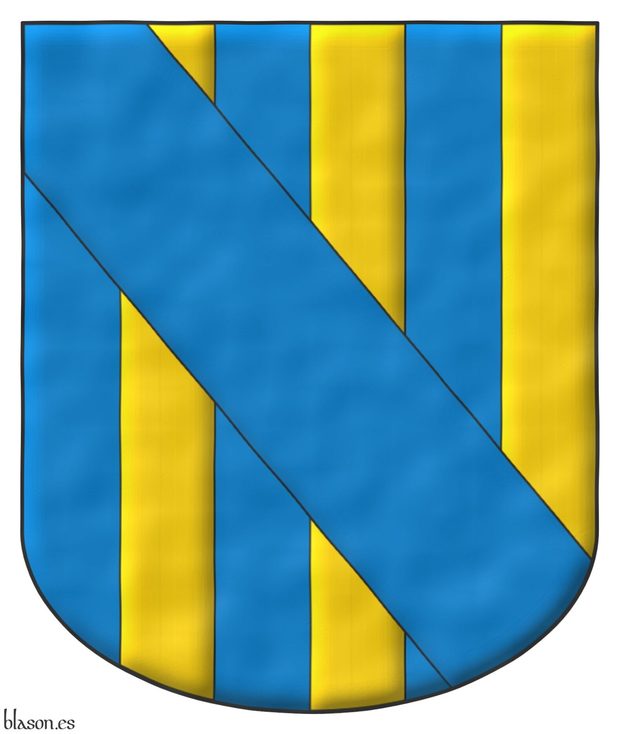
Paly of six Azure and Or; over all a bend Azure.
Escudo palado de seis piezas de azur y oro; brochante sobre el todo una banda de azur.
Blazon keywords: Paly, Six, Azure, Or, Surmounted, Overall (deprecated) and Bend.
Style keywords: Semi-circular, Freehand, Illuminated and Outlined in sable.
Classification: Coat of arms, Interpreted and Personal.
Bearer: Gifra, Vittorio.


Vittorio Gifra, pointed shield and metal beaten finish
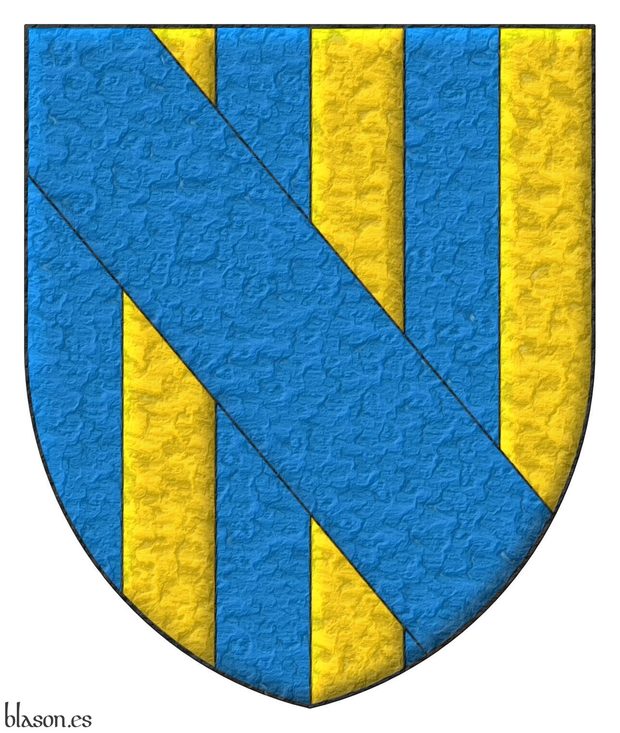
Paly of six Azure and Or; over all a bend Azure.
Blazon keywords: Paly, Six, Azure, Or, Surmounted, Overall (deprecated) and Bend.
Style keywords: Pointed, Metal beaten, Illuminated and Outlined in sable.
Classification: Coat of arms, Interpreted and Personal.
Bearer: Gifra, Vittorio.

Continue with: Vittorio Gifra, triangular curved shape and iridescent finish.
-
Language
-
Categories of heraldry
-
Divisions of the field
- Without divisions
- Party per pale
- Party per fess
- Party per bend
- Party per bend sinister
- Tierce
- Tierce sinister
- Tierced per pale
- Tierced per fess
- Tierced per bend
- Tierced pallwise inverted
- Quarterly
- Quarterly per saltire
- Gyronny
- Party per fess, the chief per pale
- Party per pale, the sinister per fess
- Party per fess, the base per pale
- Party per pale, the dexter per fess
- Chapé
- Chaussé
- Embrassé
- Contre-embrassé
- Party per chevron
- Enté
- Enté en point
- Flanched
-
Metals
-
Colours
-
Furs
-
Other tinctures
-
Ordinaries and sub-ordinaries
-
Diminutives of the ordinaries
-
Geometric charges
-
Composite ordinaries
-
Inanimate charges from Nature
Atom, Crescent, Diamond, Emerald, Estoile, Increscent, Lightning flash, Moon, Mount, Mullet, Mullet of four points, Orbital, Plough of Ursa Major, Rainbow, Ray of the sun, River, Sea, Snowflake, Sun, Sun in splendour, Sun of May, Trimount, Water and Wave.
-
Vegetal charges from Nature
Acorn, Apple, Apple tree, Ash, Bluebonnet, Camellia, Chrysanthemum, Cinquefoil, Cornflower, Dogwood flower, Double rose, Elm, Fleur de lis, Flower, Gourd, Holm oak, Hop cone, Indian paintbrush, Kapok tree, Laurel, Lily, Linden, Lotus flower, Madonna lily, Mexican cedar tree, Oak, Olive tree, Palm tree, Plantain plant, Pomegranate, Poplar leaf, Rose, Shamrock, Sunflower, Thistle, Tree, Tulip, Vine and Wheat.
-
Animal charges from Nature
Badger, Bald eagle, Barbel, Barn owl, Bear, Beaver, Bee, Beetle, Bighorn sheep, Binson, Blackbird, Boar, Brach hound, Bull, Doe, Dog, Dolphin, Dove, Eagle, Elephant, Falcon, Female figure, Fish, Flame, Fly, Fox, Frog, Goat, Goldfinch, Goose, Heron, Horse, Hummingbird, Jaguar, Lark, Leopard, Lion, Lion passant, Lion rampant guardant, Lioness, Lynx, Male figure, Martlet, Merino ram, Owl, Panther, Parrot, Peacock, Pelican, Pelican in her piety, Pronghorn, Puffin, Quetzal, Raven, Roe deer, Rooster, Savage, Seagull, Serpent, She-wolf, Stag, Starling, Talbot, Turtle, Tyger, Vulture, Warren hound and Wolf.
-
Parts of natural charges
Arm, Beak, Branch, Caboshed, Chest, Claw, Covert, Dorsal fin, Eagle claw, Ermine spot, Escallop, Feather, Foot (palmiped), Foreleg, Forepaw, Hand, Head, Heart, Hoof, Leaf, Neck, Ostrich feather, Palm frond, Paw, Roe deers' attires, Shoulder, Sprig, Stags' attires, Stem, Swallow-tail, Tail, Tail addorsed, Tail fin, Talon, Tibia, Tooth, Trunk, Trunk (elephant), Two hands clasped, Two wings in vol, Udder, Wheat spike, Wing and Wrist.
-
Artificial charges
Ace of spades, Anchor, Anvil, Arch, Arm vambraced, Armillary sphere, Arrow, Axe, Bell, Bell tower, Beret, Bonfire, Book, Bookmark, Bow, Branding iron, Bridge, Broken, Buckle, Cannon, Cannon dismounted, Cannon port, Canopy roof, Carbuncle, Castle, Celtic Trinity knot, Chain, Chess rooks, Church, Clarion, Clay pot, Closed book, Club, Column, Comb, Compass rose, Conductor's baton, Cord, Covered cup, Crozier, Crucible, Cuffed, Cup, Cyclamor, Dagger, Double vajra, Drum, Ecclesiastical cap, Fanon, Federschwert, Fleam, Four crescents joined millsailwise, Galician granary, Garb, Gauntlet, Geometric solid, Grenade, Halberd, Hammer, Harp, Host, Hourglass, Key, Key ward, Knight, Knot, Lantern, Letter, Line, Loincloth, Menorah, Millrind, Millstone, Millwheel, Monstrance, Mortar, Mullet of six points pierced, Nail, Non-classic artifact, Norman ship, Number, Oar, Oil lamp, Open book, Page, Pair of scales, Parchment, Pestle, Piano, Pilgrim's staff, Plough share, Polish winged hussar, Port, Portcullis, Potent, Quill, Ribbon, Rosette of acanthus leaves, Sabre, Sackbut, Sail, Scroll, Scythe, Sheaf of tobacco, Ship, Skirt, Spear, Spear's head, Stairway, Star of David, Step, Sword, Symbol, Tetrahedron, Torch, Tower, Trident, Trumpet, Turret, Two-handed sword, Wagon-wheel, Water-bouget, Wheel, Winnowing fan and With a turret.
-
Immaterial charges
Angel, Archangel, Basilisk, Dragon, Dragon's head, Garuda, Golden fleece, Griffin, Heart enflamed, Justice, Mermaid, Our Lady of Mercy, Ouroboros, Paschal lamb, Pegasus, Phoenix, Sacred Heart of Jesus, Saint George, Sea-griffin, Trinity, Triton, Unicorn, Winged hand and Wyvern.
-
External elements
-
Heraldic creations
-
References
-
Formats
-
Keywords on this page
Port and windows, Proper, Iridescent (nacar), Parchment, Pointed, Armed, Armorial roll, Azure, Bend, Bibliography, Bordure, Surmounted, Chain, Charged, Castle, Crown, Closed royal crown, Crowned, Cross, Cross moline, Cross of Jerusalem, Cross potent, Cross couped, Quarterly, Four, Outlined in sable, In color, In the fess point, In base, Link, Enté, Coat of arms, Inescutcheon, Emerald, Schema, Fleur de lis, Personal, Gifra, Vittorio, Gules, Illuminated, Interpreted, Semi-circular, Or, Paly, Argent, Six, Overall (deprecated), Plain tincture and Freehand.

